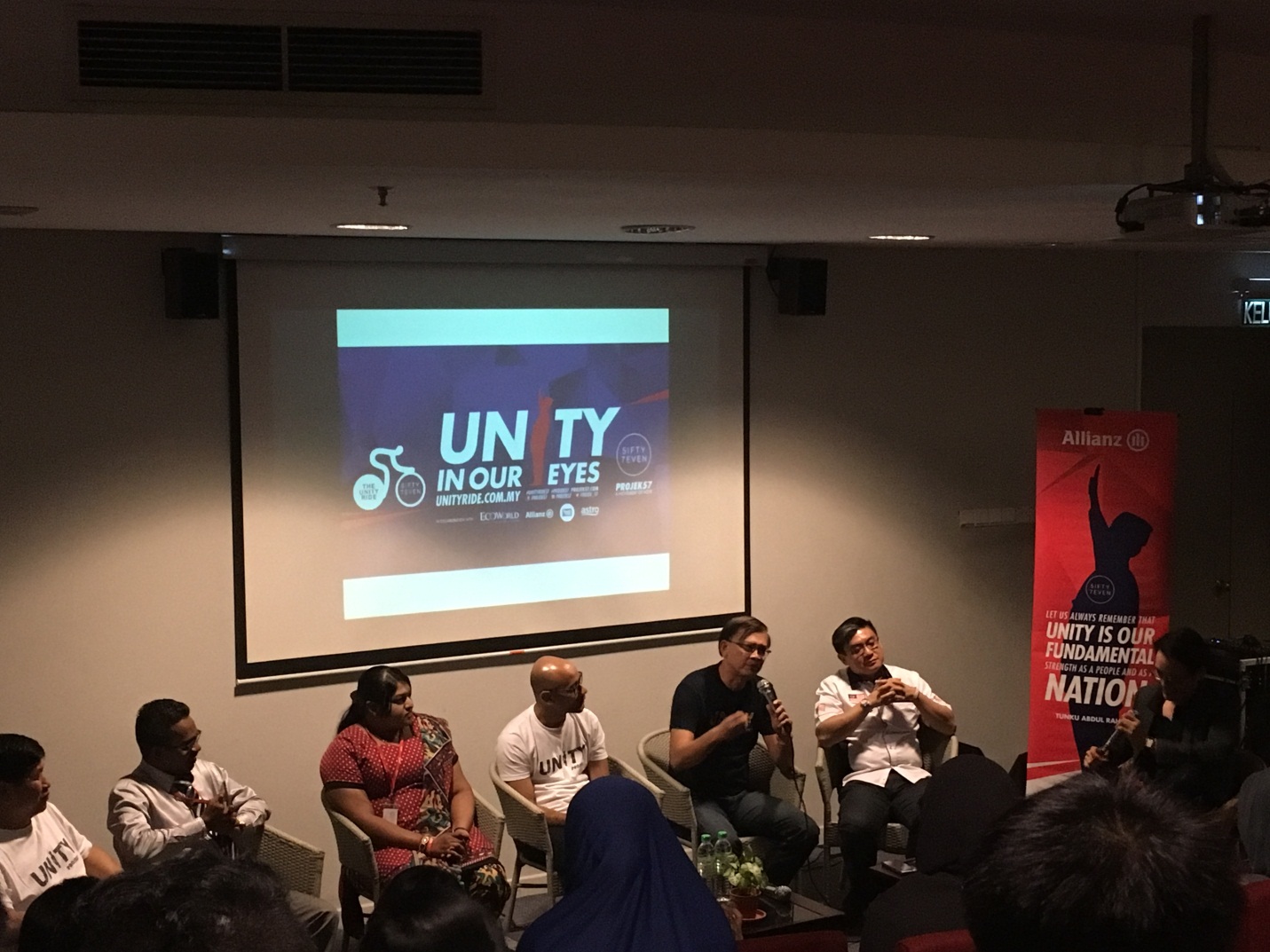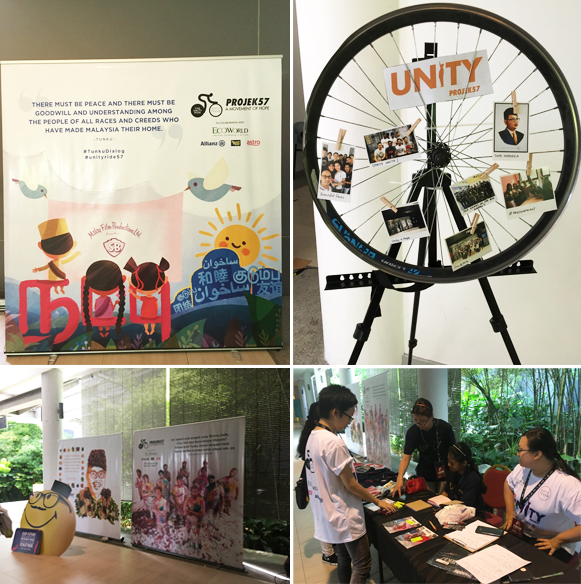


Zakri (with the microphone) sharing his thoughts on the importance of unity, while (from left) Swee, Gangadurai, Yuvashini, Syed Sadiq, Wong and Tang listen attentively
When the first Prime Minister of Malaysia, Tunku Abdul Rahman, hailed, “Merdeka! Merdeka! Merdeka!” in 1957, the nation united to celebrate the independence of Malaysia, and till today, the spirit of unity remains unbroken as speakers and participants discussed on what unity meant to them, at the “Unity in Our Eyes” dialogue, co-organised by the Department of Student Affairs (DSA) Kampar and Projek 57, on 7 August 2017 at the Kampar Campus.
Present at the dialogue session were a panel of speakers, consisting of Projek 57 Founders Collin Swee and Syed Sadiq Albar, Allianz Malaysia CEO Zakri bin Mohd Khir, Malaysia Book of Record Chief Operating Officer Christopher Wong, UTAR Centre for Foundation Studies (CFS) Kampar lecturers Gangadurai Ganesan and Yuvashini Salvamani, along with staff and students.
With an introduction first given by Projek 57 Founders, Swee and Syed Sadiq played a video that showcased the historical moments of Malaysia, in hope to remind the participants of the importance of unity that has led up to Malaysia’s 60th Merdeka celebration.
“Before we became partners in Projek 57, we were business rivalries but we have always maintained a healthy competition because we believe that through mutual trust and respect, nothing is impossible. Now we are working together with the goal to engage the youth and educate them on how they can support themselves financially and most importantly to tell the youths of the wonders of Malaysia,” said Syed Sadiq.
Swee continued, “Youth these days has the thought that Malaysia lacks opportunity, and that concerns us because Malaysia is, in fact, full of opportunities for you to explore, and eventually you will be the very generation that will build the Malaysia of tomorrow. Hence, we want to inspire the youth to be hopeful for the future and to work together to come out with fresh, brilliant ideas to bring positive contribution and impact to the society.”
For UTAR also envisions being a global university of educational excellence with transformative societal impact, the dialogue session certainly aimed to create awareness among the participants on the importance of unity; learning to embrace each other’s differences and to work together without any sense of discrimination and negative perceptions. The university also believes, that through one of its educational pillars, sociality and humanitarianism, students are instilled with the consciousness of their role in the professional arena and to the society, where they can work harmoniously together, helping each other and spread the message of unity.
“Do you think unity in Malaysia is headed in the right direction, and is unity and integration important?” asked moderator Aaron Tang from Leaderonomics, and so began the dialogue session, with the speakers taking turns to share their opinion.
“Firstly, yes. Unity is important because unity to me is about us projecting ourselves as Malaysians, rather than identifying ourselves as a specific individual. We need to come together, collectively, in our Malaysian identity,” said Zakri.
Gangadurai remarked, “Unity is an important instrument to achieve our target. Therefore, we need to understand our society alike and differences; understand the needs and expectations of people of different races, fathom the challenges, and learn to be united. Only then, we can achieve our goals easily.”
On the question about identifying role models of unity, Wong explained that everyone is capable of being a role model through small actions of kindness and advised participants to always inspire each other and encourage unity among one another.
On the same note, Yuvashini commented, “I think educators are also good role models because apart from imparting knowledge to the students, educators also helped equip students with broader insights and shape their mindset. I teach the subject Ethnic Relations, and sometimes, I play videos that showcase the different cultures of Malaysia so my students will have a better understanding of each other’s culture.”
Zakri, on the other hand, named Dato’ Onn Jaafar as his role model of unity. He recalled his history lessons and enlightened the participants on Dato’ Onn Jaafar’s attempt to create a multiracial party because he knew the essence of unity and its meaning, but the party was unfortunately not favoured by many.
When Tang asked the speakers on how social norms challenge the drive for unity and integration, Swee answered, “We tend to see people with a different mindset, where we identify them according to their specific race because it has become a norm in our society.” However, he advised participants to use social norms as strength to unite the people, rather than a tool to differentiate people.
Syed Sadiq added to Swee’s comment, and said, “Tunku Abdul Rahman once said ‘our future depends on how well many different kinds of people can live and work together’, which is very true, because at present, we have become a very sensitive society and we have lost our sense of humour. Back in my time, we would address each other with names that the society now deems as inappropriate or highly sensitive.”
Meanwhile, Zakri encouraged the participants to interact with friends of various cultures; learn about their cultures and accept each other’s differences, while Wong likewise encouraged participants to be open minded, step out of their comfort zone and take initiative to learn about different cultures.
Regarding the steps needed for students to encourage unity, Yuvashini mentioned that participants should socialise with people of other ethnicities, to respect and tolerate each other’s differences and to adapt to living among different races.
From Wong, he advised the participants to expose themselves to learning about other people’s culture, either by attending a dialogue session as such, cooperating for joint projects, or even as simple as attending open houses during festivity.
Agreeing with Wong, Swee reminded the participants of the diverse cultures and ethnics in Malaysia that have contributed to Malaysia being a unique country and encouraged participants to step up being leaders that will make the right changes for restoring unity among Malaysians.
The talk proceeded with the insights of social norms in Malaysia, in which Zakri encouraged the students to mingle around with friends in different cultures, and at the same time accept and embrace their own ethnic, heritage and identity. Supporting Zakri’s statement, Wong encouraged the students to open up their mind and get involved with those who are from different cultural background, step out of their cultures comfort zone, and try to approach other cultures.
The dialogue session then ended with an interactive Q&A session, followed by the movie screening of “Ola Bola”.

Props and booth of Projek 57
© 2019 UNIVERSITI TUNKU ABDUL RAHMAN DU012(A).
Wholly owned by UTAR Education Foundation Co. No. 578227-M LEGAL STATEMENT TERM OF USAGE PRIVACY NOTICE